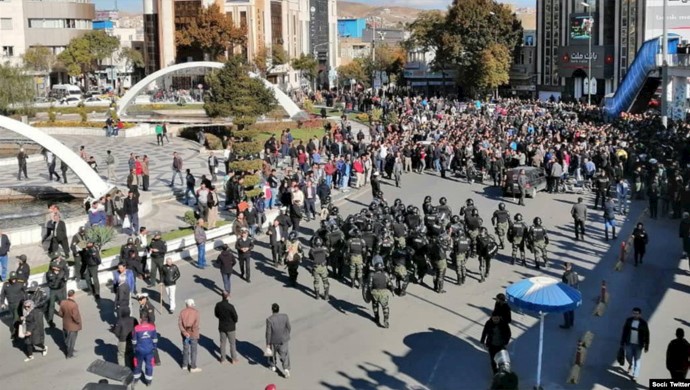Iran, December 10, 2019—As the world celebrates the 71st anniversary of the Human Rights Day, Iran is witnessing an ongoing crime against humanity. Since November 15, when the Iranian regime suddenly implemented an unprecedented hike on the price of gasoline, Iranians in more than 190 cities across the country have been protesting for their livelihoods and their most basic rights.
The protesters, most of whom are from the impoverished segments of the society, have been hit hard by a stagnating economy that is the direct result of the 40-year tyrannical rule of the mullahs. Their demands are clear: they don’t want to pay the price of the corruption of their rulers, and they want to live in freedom and dignity.
But like any other protest that takes place in Iran, the regime’s response to the November uprisings has been with an iron fist. Very little is known about what is happening in Iran because of the severe control the regime is exerting on all communication channels. But the limited information that has trickled out of the country thanks to the brave efforts of activists has shocked the world.
Videos obtained from inside Iran show security forces shooting at protesters from helicopters. Several videos show security forces directly aiming their rifles and handguns at the demonstrators and shooting them from point-blank range. According to one report from the southern city of Mahshahr, the Revolutionary Guards (IRGC) have killed at least 100 people, surrounding them in a marsh and massacring them with machine guns.
According to information obtained by the network of the People’s Mojahedin Organization of Iran (PMOI/MEK) inside Iran, at least 1,000 protesters have been killed, including several minors. 4,000 others have been injured and 12,000 have been taken to the regime’s prisons. Their fate is mostly unknown. Iranian officials are regularly threatening to torture and execute the prisoners to intimidate anyone else who is harboring thoughts to raise their voice against the regime. There are already reports that pertain several protesters have died under torture inside Iran’s prisons.
The regime is going to great lengths to hide its crimes. Iranian security forces are regularly inspecting hospitals, rounding up injured protesters and the bodies of the dead. They also refrain from handing over the dead bodies to the families and only do so on the condition that they do not hold a funeral and bury their loved ones in silence and solitude.
On November 17, Iranian authorities imposed a near-total shutdown on internet services, cutting off all communications to prevent news of the protests from reaching the world. They also used the internet blackout to be able to give free rein to their security forces to brutally slaughter Iranian protesters. The regime continues to implement a plan to put indefinite limits on access to internet services with the main purpose of preventing protests from taking place.
"… the continuation of the uprising despite a brutal crackdown by Iranian security forces and a near-total internet blackout have served as a terrifying reality check for the regime’s authorities…"#Iran#IranProtestshttps://t.co/gyKlMMopi6
— People's Mojahedin Organization of Iran (PMOI/MEK) (@Mojahedineng) December 9, 2019
At this critical juncture in Iran’s history, the world has a pivotal role to play. What is happening inside Iran is a crime against humanity that needs the attention of all nations. The international community must hold the regime and its officials to account for the crimes they have committed in the past month. As Mrs. Maryam Rajavi, president-elect of the National Council of Resistance of Iran (NCRI) has said, “World governments and international bodies must set aside all considerations and reservations about the regime. The EU should demand an immediate halt to the killings and arrests. If the regime does not comply, they must readily pull the trigger of UN Security Council sanctions.”
Mrs. Rajavi also called on the United Nations to immediately dispatch a fact-finding mission to Iran to investigate about those killed, injured and imprisoned.
UN must immediately dispatch fact-finding missions to Iran to investigate about those killed or arrested during the #Iran Uprising- Message on #HumanRightsDay https://t.co/VOZceZreh2 pic.twitter.com/REARpE7Xop
— Maryam Rajavi (@Maryam_Rajavi) December 10, 2019
The mullahs’ regime has proven that it will do anything to preserve their hold on power. In the summer of 1988, under the order of regime founder Ruhollah Khomeini, Iranian authorities executed more than 30,000 political prisoners, mostly members, and supporters of the PMOI/MEK, in the span of a few weeks.
The 1988 massacre happened while the mullahs were feeling an existential threat to their rule and wanted to ensure the survival of their regime by eliminating all opposition members. Many of the officials who were directly involved in the 1988 massacre are now holding key positions of power.
At the time, the international community turned a blind eye and allowed regime officials to continue their crimes with impunity. Today, the regime is conducting another mass slaughter of innocents to prevent its inevitable collapse. The world must not let the regime get away with murder again.





